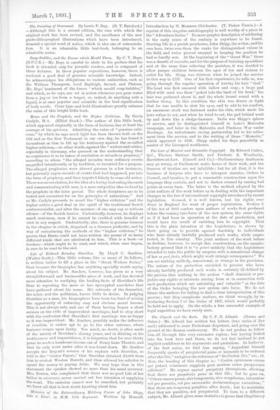The Law of Musical and Dramatic Copyright. By Edward Cutler,
Q.C., Thomas Eustace Smith, and Frederic E. Weatherly, Barristers-at-Law. (Cassell and Co.)—Parliamentary draftsmen may go wrong, or Parliament make havoc of their work, and the framers of treaties are not infallible ; but for all that, it is the business of lawyers who have to interpret statutes, Orders in Council, and treaties, to put a reasonable construction upon the language they contain, and not to darken counsel by raising bad points at every turn. The latter is the method adopted by the joint authors of the work before us in dealing with the important changes in the law of international copyright introduced by recent legislation. Gounod, it is well known, lost his rights over Faust in England for want of proper registration. Section 0 of the Act of 1880 confers upon authors of works first produced before the coming into force of the now system, the same rights as if it had been in operation at the date of production, and would have the result of entitling him to copyright. That this is the plain intention of the Legislature, is shown by their going on to provide against hardship to individuals who have already lawfully produced such works, while unpro- tected, in this country. The joint authors of the work before us decline, however, to accept this construction, on the unsatis- factory ground that it is "a priori unlikely that the Legislature intended to take the public by surprise with a sensational change of law ex post facto, which might work strange consequences." We can see nothing unlikely, sensational, or strange in the provision. The nature of the protection extended to persons who have already lawfully produced such works is certainly ill-defined by the proviso that nothing in the section " shall diminish or pre- judice any rights or interests arising from or in connection with such production which are subsisting and valuable" at the date of the Order bringing the new system into force. We do not blame the authors for failing to find a clear interpretation of this proviso ; but they complicate matters, we think wrongly, by in- troducing Section 7 of the Order of 1887, which would probably be held not to apply. On the whole, a loss successful example of legal exposition we have rarely seen.






































 Previous page
Previous page